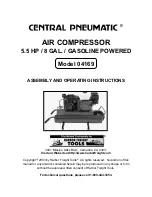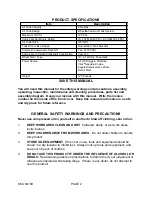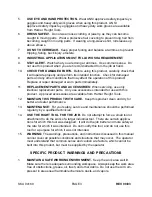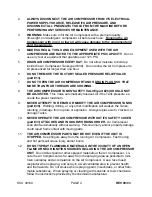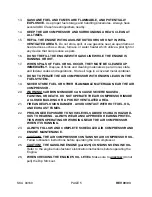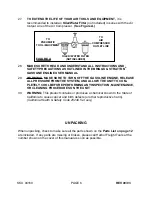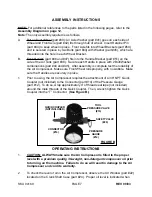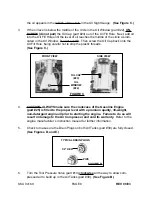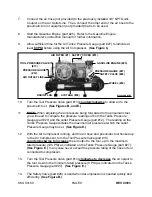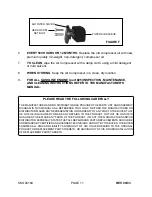
2.
ALWAYS DISCONNECT THE AIR COMPRESSOR FROM ITS ELECTRICAL
POWER SUPPLY SOURCE, RELEASE ITS AIR PRESSURE, AND
DISCONNECT ALL PNEUMATIC TOOLS FROM THE MACHINE BEFORE
PERFORMING ANY SERVICES OR MAINTENANCE.
3.
WARNING:
Make sure to fill the Air Compressor with a premium quality,
30-weight, non-detergent, compressor oil before each use.
Running the Air
Compressor with no oil or low oil will cause damage to the equipment and
void the warranty.
4.
MAKE SURE ALL TOOLS AND EQUIPMENT USED WITH THE AIR
COMPRESSOR ARE RATED TO THE APPROPRIATE PSI CAPACITY.
Do not
use any tool or equipment that operates over 125 PSI.
5.
DRAIN AIR COMPRESSOR EVERY DAY.
Do not allow moisture to build up
inside the Air Compressor Tanks (part #39). Do not allow the Air Compressor to
sit pressurized for longer than one hour.
6.
DO NOT REMOVE THE FACTORY SEALED PRESSURE RELIEF VALVE
(part #13).
7.
DO NOT OPEN THE AIR COMPRESSOR TANKS’ DRAIN PLUGS SO THAT
MORE THAN FOUR THREADS ARE SHOWING.
8.
THE AIR COMPRESSOR TANKS’ SAFETY VALVE (part #29) SHOULD NOT
BE ADJUSTED.
This Valve automatically releases air if the Tank pressure ex-
ceeds the preset maximum.
9.
NEVER ATTEMPT TO REPAIR OR MODIFY THE AIR COMPRESSOR TANKS
(part #39).
Welding, drilling, or any other modification will weaken the Tanks,
resulting in damage from rupture or explosion. Always replace worn, cracked, or
damage Tanks.
10.
NEVER OPERATE THE AIR COMPRESSOR WITHOUT ITS SAFETY COVER
(part #31) ATTACHED AND IN GOOD WORKING ORDER.
Air Compressor
scan start automatically without warning. Personal injury and/or property damage
could result from contact with moving parts.
11.
THE AIR COMPRESSOR PARTS MAY BE HOT EVEN IF THE UNIT IS
STOPPED.
Keep fingers away from the running Air Compressor. Fast moving
and hot parts will cause injury and/or burns.
12.
DO NOT SPRAY FLAMMABLE MATERIALS IN THE VICINITY OF AN OPEN
FLAME OR NEAR IGNITION SOURCES INCLUDING THE AIR COMPRESSOR
UNIT.
Do not direct paint or other sprayed materials at the Air Compressor. Lo-
cate the Air Compressor as far away from the spraying area as possible to mini-
mize overspray and accumulation on the Air Compressor. Use a face mask/
respirator when spraying, and spray in a well ventilated area to prevent health
and fire hazards. Do not smoke when spraying paint, insecticides, or other flam-
mable substances. When spraying or cleaning with solvents or toxic chemicals,
follow the instructions provided by the chemical manufacturer.
SKU 04169
PAGE 4
REV 09/03

